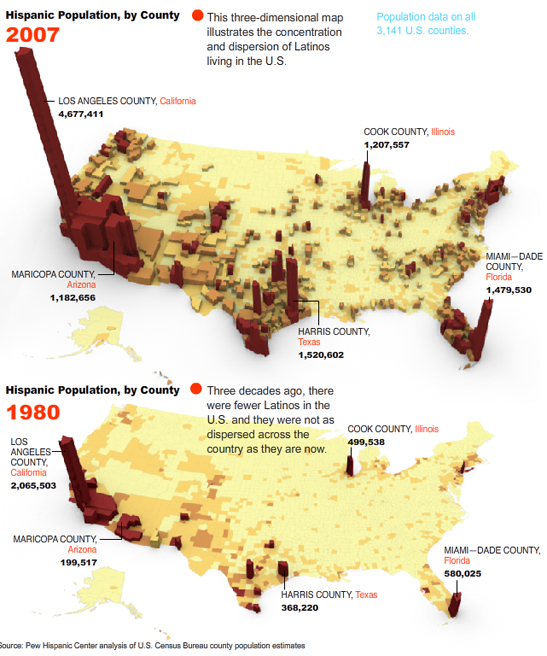"Where are Latinos in the media?" asks a Dallas Morning News reader. The response to this E-mail question was that there are plenty of Hispanics living in the U.S. who play valuable roles in their communities, like doctors, lawyers, professors, etc., who tend to accomplish things that aren't newsworthy. The response I think sums up the conundrum of the media and its representation of groups of people - if people are obeying the law and making positive contributions to society, it's rarely news (there's simply not enough space on the budget to build a story for everyone who're doing good things). When people break the law and disrupt the order of social norms, their mugshot is on the 5 o'clock. In this case, the more mugshots lead to more images sketched into the public's mind of Latino criminals overshadowing the exponentially larger number of Hispanic doctors, lawyers, teachers and students.
That question was asked in 2007, the year illegal immigration became a political storm of controversy in Oklahoma, which I remember well. I wrote a story on Randy Terrill's House Bill 1804 and its effect on OCCC, one of the state's most diverse colleges (In Fall 2007, OCCC's enrollment comprised of 30 percent minority students, compared with OU that same period, in which minorities made up 23 percent of Fall '07 enrollments).
The feelings on the OCCC campus during the time were frustration because people felt the bill provided resistance against the college's strive for a multi-culturally diverse setting, anger against Terrill for supposedly wanting to deny immigrants an education and confusion toward how the bill would affect the college's 104 Hispanic students.
In reality, the law simply stated that if illegal students wanted to keep going to college then they needed to show that they had already, or were planning, to apply for U.S. citizenship within a year of the law taking effect (Nov. 1, 2007).
Despite the bill's simple language (I thought), it polarized much of the state - one side felt that people who advocated for illegals' presence in the U.S. really wanted to take advantage of cheap, tax-free labor. The other side threw back accusations of racism and intolerance-motivated rhetoric on behalf of those who wanted to see illegals persecuted for not obeying the law. The perception in the media of a violent, illegal Mexican with no regard for the law and its citizens running amok selling drugs and dating your daughters did not help.
But anyway, this isn't a policy reform class, it's a course about race, gender and the media. It's no question that a reporter's views and opinions somehow, though it shouldn't outside of a column or an op-ed, influence how a news story is told. That reporter's experience, mindset and relationship with other people influence how they obtain sources and construct a news story.
Regardless of how anyone in the news room feels about the U.S. government's stance on laws and pending legislation, the news still has to be told with concern for the 5 W's and 1 H. This suffers when someone in the media steps outside the scope of their profession to deny anyone their side of the story, be they of any race, gender, religious affiliation, political affiliation, sexual orientation or social status.
Yes, that means you, reporter, have to make an effort to call the 90-year-old White Supremacist, KKK member who likes to set cute puppies on fire and give him a fair and accurate position in a story. It doesn't matter what you, or most of society think of him - it's your job, and the journalistic standards from which you agreed with, whether you're aware of it or not, dictates that you do not create news. I.e., you do not assume that no one in the community likes the 90-year-old racist, puppy-hater. If you suspect this to be the case, you must get quotes from other people within the community. On second thought, scratch that - get other people's opinion regardless.
You cannot deny a group of people their side of a news story. Specifically, you cannot ignore giving illegal Hispanics a fair representation just because you have difficulty breaking the language barrier, confirming who's a legal resident and who isn't or disagree with their presence in the U.S. in general. Their existence within U.S. borders plays a huge role in immigration laws, which is an even bigger political problem that might not be solved that easily. Given that Latinos impact society and local communities to such a degree, why would the media give a one-sided narrative of this population that results in the prolonging of negative and unconfirmed beliefs (illegals are violent criminals)? The language barrier and the notion that people breaking the law shouldn't be given a fair representation in the media are copout reasons for why the media does a poor job. The truth comes from the existence of diversity in the news room, or lack thereof - if enough Latinos and Hispanics are employed by media, then they can reach this "impenetrable" demographic.
Also, just in case you were wondering whether Mexicans prefer to be called "Latino" or "Hispanic" because you might've noticed I used both terms interchangeably, here is a helpful link to understanding the social and political reasons for the terms.
Below is a dispersion graphic for the Latino population in 1980 and 2007. What are we gonna do with all these violent criminals?

that post was longer than i thought it'd be. didn't mean to do it, i just type what i think
ReplyDeleteA good post. Although, at times I think we are in a policy discussion class. Thanks for the link?
ReplyDelete